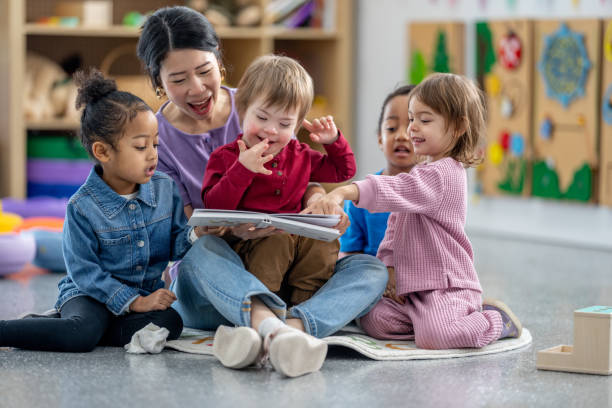
Nursery school marks a major milestone in a child’s early years, offering a structured environment where they begin to explore social interactions beyond their immediate family. While early education is crucial for cognitive growth, the social benefits of nursery school are just as significant.
Through daily interactions, guided play, and structured learning experiences, children build communication skills, emotional intelligence, and friendships that shape their future.
For parents seeking a nurturing and engaging environment, enrolling their child in a high-quality setting like nursery West Ealing ensures they receive the right support during these crucial early years.
The Importance of Social Development in Early Childhood
The first five years of a child’s life are essential for shaping their emotional and social skills. Research shows that early social interactions significantly influence a child’s ability to form healthy relationships, communicate effectively, and regulate emotions later in life. Nursery school provides an ideal setting for this development, giving children opportunities to engage with peers, navigate group dynamics, and develop essential interpersonal skills in a safe and nurturing environment.
At home, a child’s social interactions are often limited to family members or close acquaintances. However, nursery school introduces them to a diverse group of children and adults, allowing them to interact in new ways. These interactions are vital for learning how to share, express emotions, and collaborate with others—skills that are foundational for future academic and personal success.
How Nursery Schools Foster Social Growth
Building Early Friendships and Social Bonds
One of the most exciting aspects of nursery school is the opportunity for children to make their first friends. These early friendships play a vital role in helping children develop empathy, patience, and cooperation. Through shared experiences—whether playing in a sandbox, painting a picture together, or engaging in pretend play—children learn how to navigate relationships, resolve conflicts, and support one another.
Friendships formed in early childhood often serve as a child’s first lesson in trust and companionship. In a nursery environment, children begin to understand that forming connections with others requires kindness, respect, and communication. These social bonds help build confidence and a sense of belonging, both of which are crucial for emotional well-being.
Encouraging Strong Communication Skills
Language development and social skills go hand in hand. At nursery school, children are exposed to various forms of communication, from verbal conversations and storytelling to songs and role-playing activities. Teachers encourage children to express themselves, ask questions, and articulate their feelings, helping them develop strong communication skills that will benefit them in later years.
For children who are still developing their language abilities, nursery school provides valuable exposure to conversations and vocabulary expansion. Hearing peers and teachers speak allows children to learn new words and sentence structures, which enhances their ability to express thoughts and emotions effectively.
Teaching Teamwork, Cooperation, and Conflict Resolution
Collaboration is a fundamental skill that children begin to develop in nursery school. Through group activities such as building blocks, board games, and classroom projects, children learn how to work as a team, share responsibilities, and listen to others’ ideas. These activities encourage cooperation and show children the importance of collective effort.
Conflict resolution is another essential lesson learned at nursery school. Disagreements are inevitable in a social setting, but trained teachers guide children through conflicts in a way that promotes understanding and problem-solving. Whether it’s learning to take turns, apologizing after an argument, or finding a compromise, children develop the skills they need to handle social challenges in a healthy and constructive manner.
Developing Emotional Intelligence and Self-Regulation
Nursery school helps children recognize and regulate their emotions by providing structured guidance on expressing feelings appropriately. Emotional intelligence—the ability to understand, express, and manage emotions—is a key factor in long-term success and well-being.
Through activities such as storytelling, role-playing, and group discussions, children learn to recognize different emotions and how to handle them. Teachers help children navigate feelings of frustration, sadness, and excitement, teaching coping mechanisms such as deep breathing, taking a break, or talking about their emotions. Over time, children become more skilled at managing their own emotions and recognizing those of others, fostering empathy and understanding.
Boosting Confidence and Independence
A sense of independence is vital for a child’s self-esteem and confidence. Nursery school allows children to make small decisions, such as choosing which activity to participate in or selecting their own snack. These seemingly simple choices empower children to trust their own judgment and develop a sense of autonomy.
Daily routines, such as putting away toys, dressing themselves, and washing their hands, also contribute to self-reliance. Encouraging independence at a young age helps children feel capable and prepared for the more structured environment of primary school.
Why Nursery Schools Provide the Best Environment for Social Learning
Nursery schools are designed to foster both academic and social growth in a safe and supportive setting. In a high-quality nursery like nursery schools in Ealing, children are surrounded by experienced educators who guide them through the complexities of social interaction, emotional development, and early learning. The structured yet flexible approach ensures that each child receives the right balance of independence and support.
Moreover, nurseries expose children to diverse cultural backgrounds, personalities, and perspectives, enriching their social understanding and preparing them for the increasingly global world they will grow up in. Social inclusivity and group activities encourage children to appreciate differences and learn how to work alongside individuals with varying experiences and viewpoints.
Final Thoughts
The social benefits of nursery school extend far beyond playtime and structured learning. These early experiences shape a child’s ability to interact with others, communicate effectively, and develop emotional intelligence. As children engage in friendships, teamwork, and cooperative activities, they build a strong foundation for future academic and social success.
Investing in early social development helps children grow into confident, empathetic, and well-rounded individuals who are prepared for the challenges and opportunities that lie ahead.
Read More :- Tiny Feet, Big Beats: How Music and Dance Boost Early Development